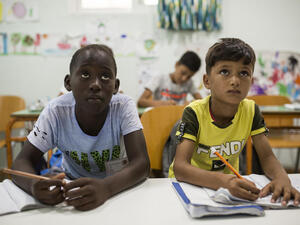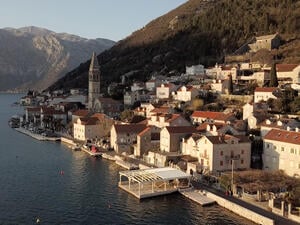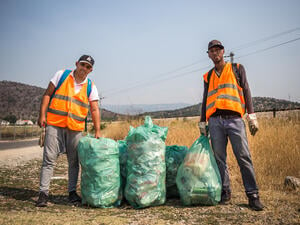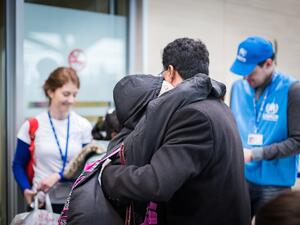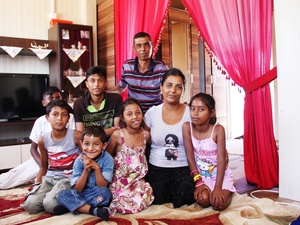UNHCR closes last official collective centre for displaced in Montenegro
UNHCR closes last official collective centre for displaced in Montenegro

The Vekic family are among the families moved into the European House in Niksic after years in collective accommodation.
NIKSIC, Montenegro, May 20 (UNHCR) - The UN refugee agency wrapped up its long programme of emergency shelter provision for refugees in Montenegro earlier this week with the closure of a collective centre in the town of Niksic.
UNHCR representatives and government officials attended the closing ceremony on Monday at the Trudbenik Collective Centre, which was opened in 1993 to provide shelter for refugees arriving from other countries in the former Yugoslav federation.
The 65 residents of the last official collective still open in Montenegro have been moved to family apartments in a new building - European House-owned by the municipal authorities in this city in central Montenegro. The move was made possible with support from the Montenegrin Bureau for Care of Refugees and funding from UNHCR, the European Agency for Reconstruction and the German aid agency, HELP.
UNHCR and Montenegrin officials welcomed the closure of the collective centre. "The closure of this centre is an important accomplishment as we wish to find durable solutions for these people, instead of continuing temporary arrangements," said Zeljko Sofranac, director of the Montenegrin Bureau for Care of Refugees.
"We wish to assist these people to become self-sufficient and able to lead a normal life, as opposed to dependency on humanitarian assistance, to which the collective centre environment is very conducive," he added.
UNHCR Representative to Montenegro Serge Ducasse thanked all those who had contributed to the construction of European House, adding that it "offered a more dignified life and future for all those who have moved into it."
But he also noted that while "the saga of provided collective accommodation has come to an end," many refugees still lived in sub-standard, privately owned dwellings or were squatting in informal collective centres - they also need help getting access to proper housing.
Gordana Vekic, one of the last residents of the Trudbenik Collective Centre, said she and her family were delighted to be moving to the new accommodation after nine years. "We still cannot believe it. Although the flat is owned by the municipality, this is now our home! We will finally have our own door, our own bathroom, our freedom," she enthused.
UNHCR's Ducasse said international support was still needed to ease the integration of refugees who could not, or would not, go back home. He also called on the Montenegrin authorities to do their part, saying: "It is time they [refugees] are provided with a legal status that gives them real local integration opportunities and allows them to contribute to their new society of adoption."
Ducasse added that he was "confident that we are now entering a phase in which the status of the populations of concern to us will eventually be defined, and durable solutions made possible." There are still some 24,000 refugees from Croatia, Bosnia & Herzegovina, and Kosovo in Montenegro.


